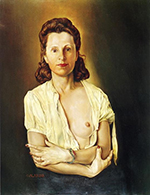
"The Comforts of Home"
"His home was to him home, workshop, church, as personal
as the
shell of a turtle and as necessary" (585).
Flannery O'Connor's "The Comforts of Home" (1960; 1965)
Points
for Reflection
Flannery O'Connor's "The Comforts of Home" (1960; 1965), 573-94
- Does O’Connor’s apparently objective, detached description of Thomas’ living conditions and expectations at the opening of this story (573) provide an oblique commentary on his character, one implicitly elaborated later?
- According to Thomas, what roles do propriety and pragmatism play in moral virtue?
- Both Thomas and his mother toss about the idea that Star Drake (Sarah Ham) can’t help behaving the way she does (574, 580, 582), that she’s “‘[b]orn without the moral faculty’” (575). Does the story itself bear out this conclusion that Star fundamentally cannot access traditional virtue?
- Thomas’ mother repeatedly asserts that her compassion is largely motivated by imagining how she’d feel if he, her son, were in Star’s situation (575, 582). Does Thomas’ own imagination grant him access to others’ experiences, similarly stoking compassion within him?
- Thomas loves his mother because “it was his nature to do so,” but sometimes has difficulty accepting her love for him: “There were times when it became nothing but pure idiot mystery and he sensed about him forces, invisible currents entirely out of his control” (575). Is this difficulty at all related to the trouble he has accepting her kindness towards Star?
- Thomas does not recognize the devil as an entity, but considers “engagements with the devil” merely a way of describing the foolhardy extremes to which his mother takes her charity (575). The narrator tells us, however, that when her “virtue got out of hand, “a sense of devils grew upon him” that were “not mental quirks in himself or the old lady,” but “denizens with personalities, present though not visible . . .” (576). What repercussions follow Thomas’ refusal to identify demons as demons?
- Sarah Ham (“Star Drake”) admits to being a congenital liar and claims that she knows there’s no hope for her because who has put the finishing touches to her education?
- Both Thomas and his mother evince a censoring impulse, Thomas wishing to spare his mother “all unpleasant sights”—including that of the sexually loose, nineteen-year-old Star in a filthy jail telling stories about being sexually abused (577)—while she tries to discourage Star from watching crime movies (579). Are their respective censoring impulses motivated by the same principles?
- Is Thomas’ father dead and gone, or just dead?
- Why does Thomas find himself unable to tell Star, definitively, what he thinks of her when he has the opportunity to do so in the car (580-81)?
- Is Thomas’ mother’s impractical, foolish love implicitly validated, or criticized, in this story?
- Thomas maintains that he is not dead set against Star herself, but of his mother's making a fool of herself in trying to love Star (583). Is this true?
- What is the nature of the “disturbance in the depths of his being” caused by Star’s person and presence, and why does it lie “somewhere out of the reach of his power of analysis” (583)?
- The current sheriff, an old friend of Thomas’ deceased father, appears rather sexist (590-91). Does Thomas’ thought-life suggest that he is equally sexist?
- Is Thomas responsible for his irrevocable action at the tale’s end?
- Why does it look as though Thomas and Star are going to embrace at the story’s end?

Galarina (1944-45)
Salvador Dalí
Dr. Paul Marchbanks
pmarchba@calpoly.edu
![]()
